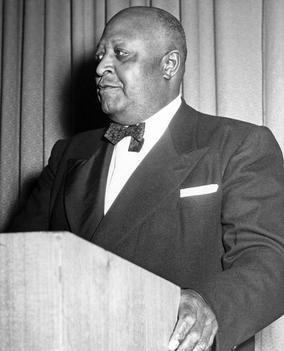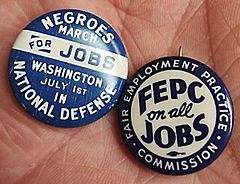Milton P. Webster facts for kids
Milton Price Webster (born April 23, 1887 – died February 24, 1965) was an American leader for workers' rights. He is best known as the first vice president of the Brotherhood of Sleeping Car Porters. He also led the union's Chicago group.
As the main negotiator for the union, Webster helped get a special agreement with the Pullman Company. This was the first national contract won by any American union led by Black people.
During World War II, President Franklin D. Roosevelt chose Webster to join the Fair Employment Practice Committee. This group worked to stop unfair treatment based on race in jobs related to the war. Their efforts helped Black workers get more jobs and made workplaces fairer.
Webster also served on the International Board of the American Federation of Labor.
Contents
Early Life and Challenges
Milton Price Webster was born on April 23, 1887, in Clarksville, Tennessee. His father, Willis, owned a barber shop and a small farm. His mother, Mary, came from a family of freed Black Tennesseans. Her father fought for the Union Army in the American Civil War.
When Milton was young, his family moved to Chicago. They moved because of unfair treatment and dangers faced by Black people in the South after the Reconstruction period. The Webster family was large and close-knit. Milton was the third youngest of 11 children.
One of Milton's early memories was seeing the Pullman Strike in 1894. He saw how harshly white railroad strikers were treated. This made him think about how Black union members might be treated.
Milton was a very good student and loved to read. He wanted to study law. However, his family did not have enough money to send him to college. He worked many different jobs. Eventually, he became a Pullman porter, a job he held for almost 18 years.
As a porter, Webster saw how workers were treated unfairly. They worked very long hours for low pay. They faced unfair rules and racism every day. Porters and maids had no one to speak up for their rights.
Webster decided that Black workers needed a union. He began organizing porters while still working. The Pullman Company tried to stop him. They gave him warnings and tried to make him quit. Milton did quit, but he kept working to form a union for Pullman porters and maids.
After leaving the railroad, Webster worked for the Chicago Municipal Court. He also worked for the Republican Party in Chicago. He married Louie Elizabeth Harris, and they had three children.
Leading the Brotherhood of Sleeping Car Porters
The Brotherhood of Sleeping Car Porters (BSCP) started in 1925. Webster asked A. Philip Randolph to be the president and main speaker for the new union. Webster became the first Vice President. He led the union's largest group in Chicago. Chicago was important because it was where the Pullman Company was based. It also had the most porters and maids. Webster's experience in Chicago politics helped him in this role.
After the union started, Webster worked hard to get more members. The Pullman Company tried to stop him. They used unfair methods and hired people to report on union activities.
As the First Vice President, Webster handled most of the union's daily work. Randolph was the public face of the union.
Fighting for Civil Rights
On June 25, 1941, President Franklin D. Roosevelt signed Executive Order 8802. This order stopped racial discrimination in jobs related to the war effort. It also created the Fair Employment Practice Committee (FEPC). Roosevelt signed this order because A. Philip Randolph, the head of the BSCP, was planning a large protest in Washington, D.C. if action was not taken.
Webster was a key organizer of the March on Washington Movement (MOWM). He led its powerful Chicago office. He helped MOWM become a national movement. It pushed for jobs and fairness for Black Americans during World War II.
The MOWM chose Milton Webster to be on the FEPC. They knew he was a skilled negotiator. His work helped increase the number of African Americans in war industries. This showed that even small steps could make a difference.
The FEPC held public meetings about racial discrimination. However, it did not always get full support from the White House. President Roosevelt moved the FEPC to a different department. But Black leaders pushed back. Roosevelt then moved the committee back under his direct control in May 1943. Webster was the only person from the first FEPC group who stayed on the new 7-member committee. This showed how valuable his skills were.
Later Life and Legacy
Milton Webster passed away suddenly on February 24, 1965. He was at a convention in Florida with A. Philip Randolph. He was survived by his wife, Louie Elizabeth, and their three children. He also had seven grandchildren.
Webster's work helped to create fairer workplaces and opened doors for many Black Americans. He played a key role in the fight for civil rights and workers' rights in the United States.



